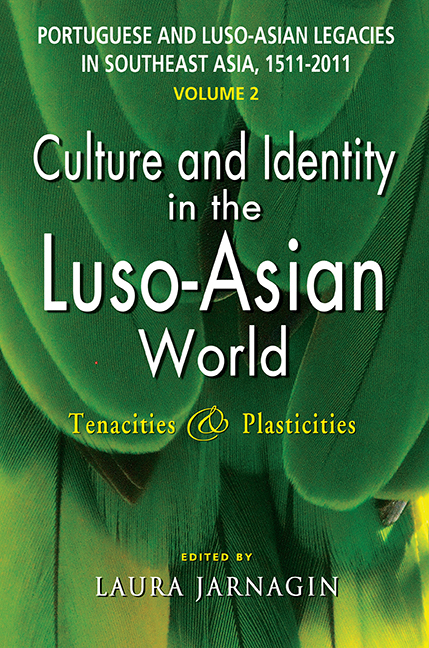 Portuguese and Luso-Asian Legacies in Southeast Asia, 1511-2011, vol. 2
Portuguese and Luso-Asian Legacies in Southeast Asia, 1511-2011, vol. 2 Book contents
- Frontmatter
- Contents
- List of Figures and Tables
- Preface
- List of Contributors
- Glossary
- Introduction: The Qualitative Properties of Cultures and Identities
- Part One Crafting Identity in the Luso-Asian World
- Part Two Cultural Components: Language, Architecture and Music
- 5 The Creole-Portuguese Language of Malacca: A Delicate Ecology
- 6 Oral Traditions of the Luso-Asian Communities: Local, Regional and Continental
- 7 Verb Markings in Makista: Continuity/Discontinuity and Accommodation
- 8 From European-Asian Conflict to Cultural Heritage: Identification of Portuguese and Spanish Forts on Ternate and Tidore Islands
- 9 The Influence of Portuguese Musical Culture in Southeast Asia in the Sixteenth and Seventeenth Centuries
- Part Three Adversity and Accommodation
- Appendix: Maps
- Bibliography
- Index
- Titles in the Nalanda-Sriwijaya Studies Centre Series
9 - The Influence of Portuguese Musical Culture in Southeast Asia in the Sixteenth and Seventeenth Centuries
from Part Two - Cultural Components: Language, Architecture and Music
Published online by Cambridge University Press: 21 October 2015
- Frontmatter
- Contents
- List of Figures and Tables
- Preface
- List of Contributors
- Glossary
- Introduction: The Qualitative Properties of Cultures and Identities
- Part One Crafting Identity in the Luso-Asian World
- Part Two Cultural Components: Language, Architecture and Music
- 5 The Creole-Portuguese Language of Malacca: A Delicate Ecology
- 6 Oral Traditions of the Luso-Asian Communities: Local, Regional and Continental
- 7 Verb Markings in Makista: Continuity/Discontinuity and Accommodation
- 8 From European-Asian Conflict to Cultural Heritage: Identification of Portuguese and Spanish Forts on Ternate and Tidore Islands
- 9 The Influence of Portuguese Musical Culture in Southeast Asia in the Sixteenth and Seventeenth Centuries
- Part Three Adversity and Accommodation
- Appendix: Maps
- Bibliography
- Index
- Titles in the Nalanda-Sriwijaya Studies Centre Series
Summary
Portugal's encounter with the world has in many respects already been the subject of academic research. However, relatively little research has yet been done on Portugal's musical influence as a result of the development of, for instance, its Southeast Asian centres in Goa, Malacca, Macao and Timor. Until today, there have been only few studies of musical life in these centres in the sixteenth and seventeenth centuries. From the time of its first encounter with Portugal through Vasco da Gama's arrival in 1498, Southeast Asia faced a persistent European attempt to control, to dominate and to proselytize in the countries between India and the Philippines. Portuguese and other European cultural and musical influences necessarily accompanied the political and religious conquests from the very beginning.
This study is part of a post-doctoral project that seeks to summarize the hitherto existing research on this subject, prior to a comprehensive study of Portuguese musical culture in its Southeast Asian urban centres in the sixteenth and seventeenth centuries. The aim of this chapter is to examine how a musical culture was established, how it interacted with local music traditions, and how both Portuguese and local cultures influenced each other over the long term. It will also try to show what kind of role music played at the intersection of missionary work, urban entertainment and imperial representation, being a means for both cultural exchange and political segregation.
“WE COME IN SEARCH OF CHRISTIANS AND SPICES”: THE BEGINNINGS OF MUSICAL INFLUENCE IN CALICUT AND GOA, INDIA
Whether or not the quotation above represents the truth, it nonetheless defines what Vasco da Gama and his companions were looking to achieve when they entered Calicut on 20 May 1498: the spread of Christianity and trade. According to A.J.R. Russell-Wood, “the half century after Vasco da Gama's arrival in Calicut (May 1498) was characterised by trade and missionary activities rather than exploration per se in the East.”
- Type
- Chapter
- Information
- Portuguese and Luso-Asian Legacies in Southeast Asia, 1511-2011, vol. 2Culture and Identity in the Luso-Asian World: Tenacities & Plasticities, pp. 208 - 222Publisher: ISEAS–Yusof Ishak InstitutePrint publication year: 2012


